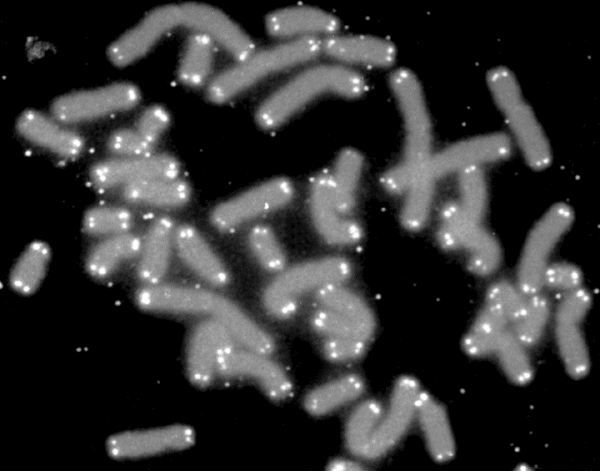Telomerase Enzymes and Aging: The Human Telomerase Enzyme May Protect Against Age-Related Diseases
Telomerase Enzymes and Aging
Scientists from the Albert Einstein College of Medicine in New York took blood samples from 86 very old, but reasonable healthy Ashkenazi Jews with an average age of 97. They also took samples from 175 of their offspring and 93 other people whose parents had lived a normal lifespan.
The scientists found that the elderly group and their children have a hyperactive version of an enzyme called telomerase that prevents a cell from aging as fast it otherwise would. The hyperactive version is the product of two mutant genes - hTERT and hTERC.
Human Telomerase

Our cells have a life cycle that includes immature and mature stages. What finishes many of them off is the fraying of the protective caps called telomeres that are situated at the tips of chromosomes.
Telomeres are repetitive regions of DNA that prevent chromosomes from being destroyed. They have been likened to the plastic tips at the ends of shoelaces that stop them from unravelling.
However, every time a cell divides the telomeres shorten and eventually they become so short that the cell dies. Telomerase enzyme can repair telomeres by adding nucleotide sequences and thereby preventing them from shrinking.
Telomerase Enzyme and Drug Therapies
The scientists at Einstein discovered that the centenarians and their offspring had higher levels of human telomerase activity and longer telomeres than the much younger control group. The older group also had higher levels of good cholesterol (HDL) and an average lower body mass index.
The research further reinforces previous work by the same study group that revealed that Ashkenazi Jewish families with a history of longevity are relatively free of some age-related illnesses such as heart disease.
What is unknown at this stage is the mechanism by which the hyperactive form of telomerase maintains telomere length, but it does seem to appear that a combination of the enzyme and telomere length work to protect older people from some diseases.
It has led scientists to wonder if a drug could be manufactured that could mimic the activity of telomerase in the centenarians - and be given to people to protect them from age-related diseases.
It sounds great in principle, but there is a potential fly in the ointment. Prolonging cell life and making them divide more increases the risk of damaging mutations that can lead to cancer. However, this doesn’t seem to happen in the centenarians so perhaps there is something else going on in their biochemistry. In addition, even though the Einstein research is extremely interesting it may not be replicated in other populations.
There’s probably no need to start planning your 150th birthday party just yet, but the evidence is mounting all the time that people who have long telomeres have fewer age-related diseases.
Reference
Genetic variation in human telomerase is associated with telomere length in Ashkenazi centenarians. Yousin Suh et al. PNAS - published November 13, 2009